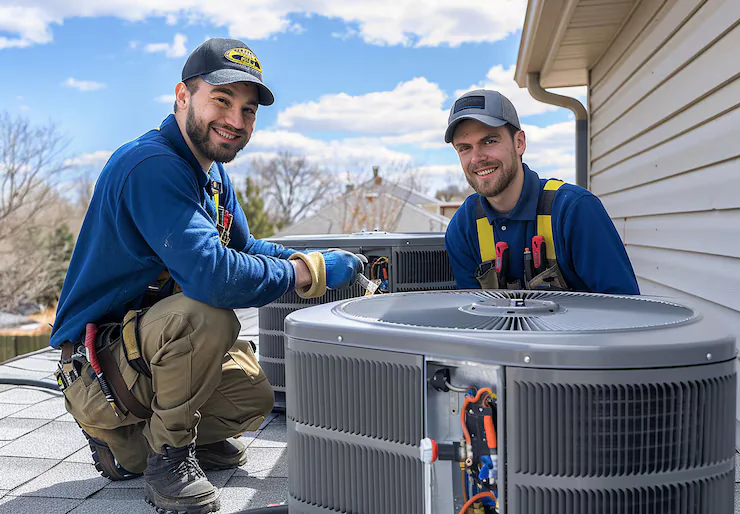If you’re thinking about upgrading your home’s heating and cooling system, you might have come across heat pumps. They’ve gained a lot of popularity, but are they the right choice for you? Let’s break down the pros and cons to help you make an informed decision.
What Is a Heat Pump?
Before we dive in, let’s start with the basics. A heat pump is a versatile system that can heat and cool your home by transferring heat between the inside and outside. Instead of generating heat, it moves it around, which can be more efficient and cost-effective.
Pros of Using Heat Pumps
1. Energy Efficiency
One of the biggest benefits of heat pumps is their energy efficiency. Unlike traditional systems that burn fuel to create heat, heat pumps use electricity to move heat from one place to another. This can be much more efficient and could save you a lot on your energy bills. In fact, modern heat pumps can be up to 300% more efficient than older systems, meaning you get a lot more heat for your energy dollar.
2. Dual Functionality
Heat pumps aren’t just for winter. They work year-round, providing both heating and cooling. In the winter, they pull heat from outside and bring it indoors, and in the summer, they do the opposite. This dual functionality means you don’t need separate systems for heating and cooling, which simplifies your setup and can save you space.
3. Environmentally Friendly
Heat pumps are also better for the environment. Since they don’t burn fossil fuels and produce fewer greenhouse gases, they’re a greener option compared to traditional heating methods. If your electricity comes from renewable sources, the environmental benefits are even greater.
See Also Common Electric Furnace Problems and Easy Fixes
4. Lower Operating Costs
Although heat pumps can be pricey to install, they usually cost less to run. Because they’re so efficient, your energy bills could be significantly lower over time. Plus, they generally need less maintenance than combustion-based systems, which can save you more in the long run.
5. Better Indoor Air Quality
Heat pumps can also improve the air quality in your home. Many models include filters that help remove dust, pollen, and other particles from the air. And since heat pumps don’t burn fuel, you avoid issues like carbon monoxide and other pollutants that can come from gas or oil heating systems.
6. Consistent Comfort
With a heat pump, you can expect more consistent indoor temperatures. They operate smoothly and steadily, which means you won’t experience the temperature swings that can happen with other systems. This can make your home feel more comfortable all year round.
Cons of Using Heat Pumps
1. High Initial Costs
One downside to heat pumps is their upfront cost. They can be more expensive to purchase and install compared to traditional systems. However, keep in mind that the long-term savings on your energy bills and lower maintenance costs can make up for this initial expense.
2. Reduced Efficiency in Extreme Cold
Heat pumps are very efficient in mild climates, but their performance can drop in very cold weather. In places with harsh winters, a heat pump might struggle to pull enough heat from the outside, which could lead to reduced efficiency. Some modern heat pumps are designed to handle cold temperatures better, but it’s something to consider.
3. Potential Noise
While most heat pumps are relatively quiet, some models can produce noise during operation. If you live in a very quiet area or if the unit is close to living spaces, this could be a concern. It’s worth looking into models that are known for their quiet operation if noise is a big issue for you.
4. Complex Installation
Installing a heat pump can be more complex than installing a traditional system. Proper installation is crucial for the system to work efficiently, so it’s important to hire a qualified technician. This complexity can add to the initial costs, but it ensures that you get the best performance from your heat pump.
5. Maintenance Needs
Although heat pumps generally require less maintenance than traditional systems, they still need regular upkeep to perform at their best. This includes tasks like cleaning or replacing filters and checking the system for any issues. Regular maintenance is important to keep your heat pump running efficiently and to avoid costly repairs.
6. Aesthetic Impact
Finally, the outdoor unit of a heat pump can be bulky and might affect the look of your property. While many people are fine with this trade-off for the benefits of energy efficiency and comfort, it’s something to think about if you have specific design preferences for your home.
See Also Ultimate Guide to Selecting the Right Electric Furnace for Your Home
Conclusion
In summary, heat pumps offer many advantages, such as energy efficiency, dual functionality, and environmental benefits. They can help lower your energy bills and improve air quality, making them a great choice for many homeowners. However, they also come with some drawbacks, like high initial costs and potential efficiency issues in very cold weather.
If you’re considering a heat pump for your home, it’s important to choose a reliable service provider to ensure a smooth installation and optimal performance. In Spring, TX, KAC Express is a trusted name for heat pump services. They offer expert installation, maintenance, and repair to keep your system running efficiently and your home comfortable throughout the year.
For more information on heat pumps and to explore the services offered by KAC Express, don’t hesitate to reach out. They’re dedicated to helping you get the most out of your heat pump system and ensuring your home stays comfortable in every season.



0 Comments